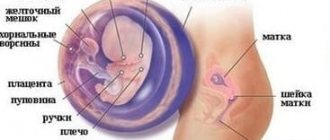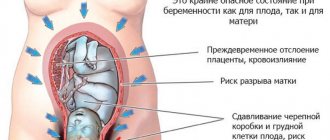Why does my stomach hurt at 29 weeks of pregnancy?
Factors that occur normally but lead to discomfort:
- increased tension in the ligaments and muscles surrounding the uterus;
- training contractions - uterine contractions that do not lead to childbirth;
- compression of internal organs without the development of an inflammatory process;
- increased fetal movement, accompanied by short-term pain;
- poor quality nutrition, leading to increased gas formation in the intestines and impaired stool formation;
- wearing uncomfortable clothing that compresses the stomach.
If these conditions are excluded, look for developing disease. It is impossible to determine it with accuracy during a general examination.
Therefore, the following research methods are prescribed:
- general analysis of blood, urine, feces;
- biochemical study to determine liver function;
- coagulogram, which determines the number of platelets and clotting factors in patients prone to thrombosis;
- determination of antibodies, leukoformula at the risk of Rh conflict between mother and fetus;
- Ultrasound of the pelvic organs, abdominal cavity, external and internal parts of the embryo;
- ECG to identify the state of the cardiovascular system.
Tests are used to determine the condition of the mother and child.
Pathological areas causing pain are identified:
- compression of the organs of the urinary system (kidneys, bladder, urethra), accompanied by an infectious and inflammatory process;
- pressure on the hepatobiliary region with impaired biliary function;
- increased uterine tone with the risk of premature birth; at this stage the child does not often survive;
- genitourinary infections with the risk of pathogenic microorganisms passing through the cervix into the amniotic fluid;
- appendicitis, colitis, duodenal ulcer, other intestinal pathologies;
- exacerbation of chronic inflammatory diseases under the influence of changes in hormonal levels.
When the disease manifests itself, the doctor prescribes medicinal, physiotherapeutic, and surgical treatment. Prescriptions are followed strictly to eliminate the risk of relapse and negative impact on the body of the mother and child.
If the discomfort reappears, seek help from a doctor and undergo an examination, since as the fetus grows, other diseases may develop.
Taking care of your health
At 7 months, a woman most often goes on maternity leave and can devote all her time to preparing for childbirth. In order to feel good, so that the child is born on time and healthy, she needs to especially carefully monitor her condition:
- move slowly and carefully, otherwise there is a danger of falling on your stomach;
- wear shoes with low heels, or better without them at all;
- rest more, try to avoid stress;
- take prenatal vitamins;
- walk more, breathe fresh air, but in winter, when there is severe ice, it is better to replace the walk with going out to the balcony;
- It is recommended to enroll in special courses that prepare for childbirth;
- It is very useful to do special gymnastics for the back and swim;
- It is necessary to wear a bandage to fix the abdomen and reduce the likelihood of stretch marks.
The 29th week of pregnancy is a period when you need to especially control your diet. It is necessary to eat as many fresh fruits and vegetables as possible, but only those that do not cause allergies (a doctor should help you choose the right plant foods).
The baby growing inside needs various natural vitamins, and his mother also needs plant fiber, which helps with constipation. You should also eat foods that contain calcium and protein. In other words, nutrition as a whole should be balanced. It is necessary to exclude everything fatty, fried, spicy, salty, smoked; fast food is unacceptable.
It is also important to monitor weight gain: normally it should be 300-350 g per week. If you gain more, then you need to eat less high-calorie foods and go on fasting days (but not hunger strikes!). Since swelling can be the cause of growing weight, it is important to drink only water, tea or juice in small quantities. You can periodically check your diuresis - compare the amount of fluid released with the amount consumed. If swelling, pain and cramps appear in the legs, you should consult a doctor and immediately take a urine test.
As for sex, it is completely acceptable if nothing hurts and the baby is developing normally. It’s just better to choose sitting or back positions so that there is no pressure on the stomach; you also shouldn’t penetrate very deeply and move actively. If pain or other health problems arise, it is better to temporarily refuse intimacy.
What causes nagging, aching pain during pregnancy?
After conception occurs, the following changes occur in the body, under the influence of which nagging, aching pain and other unpleasant symptoms are formed:
- changes in the amount and ratio of hormones;
- increase in the size of the uterus;
- psycho-emotional changes in a woman, fear of childbirth, complications;
- discrepancy of the pubic bones, load on the lower back, back.
Negative feelings are often formed under the influence of normal processes. To reduce pain, stand in a knee-elbow position, drink vitamins, go to a pressure chamber, get a massage, do swimming and exercise therapy. Treatment is resorted to only when the disease appears.
Intrauterine development
29th obstetric week – 7 months, 25th week from missed period. During this period, the child is already relatively mature and looks like a newborn.
The following happens in his body:
- the immune system is practically formed;
- the composition of the blood became constant;
- thermoregulation is actively formed;
- bone marrow functions;
- the digestive system began to work;
- the kidneys actively process swallowed amniotic fluid, releasing about 0.5 liters of urine per day;
- the baby can see, hear, smell, even distinguish voices;
- his movements become more active, because of them the woman may even experience pain;
- the original lubricant on the skin decreases, the lanugo fluff disappears;
- subcutaneous fat accumulates;
- the lungs are slowly expanding;
- liver lobules are formed;
- the pancreas begins to produce insulin;
- adrenal glands work;
- body temperature is almost constant.
The fetus at the 29th week of pregnancy is 32-38 cm long and weighs 1.2-1.5 kg. If a woman touches her stomach, it reacts with more active kicks. Due to the increased size, his arms and legs begin to protrude. The baby alternates between sleeping and waking, and the mother always feels it.
What does dull, pulling, point or cutting pain in the abdomen indicate?
Stomach pain during pregnancy is due to changes in the body, in organs associated with hormonal changes, changes in the position of internal organs, and obstetric pathologies.
Many types of these sensations do not pose a threat to the health of the mother or the condition of the fetus. Others cause significant harm and even death to the woman and the unborn child.
Pain is a reaction of the nervous system to stimuli. A symptom of many diseases, including obstetric pathologies during pregnancy. A pregnant woman experiences hormonal changes and a restructuring of many systems. They are also accompanied by this feeling.
If discomfort and pain occur, it is better to consult with your doctor about the nature of these sensations and appropriate treatment. During pregnancy, a woman is responsible not only for her own health, but also for the health of the baby.
Nature has determined that the mother’s body tries to protect the fetus from all negative influences. A plug formed from mucus in the cervix prevents pathogenic microorganisms from entering.
Umbilical cord nutrition is formed in such a way that harmful chemical compounds do not enter the fetus. The uterus itself protects the child from external mechanical influence.
At the same time, during the period of bearing a baby, the woman herself may regularly experience pain of varying intensity and nature. Each type of discomfort indicates the presence of different pathological conditions, with the exception of harmless obstetric ones associated with changes in the maternal body and preparation for childbirth.
Based on the nature, intensity of pain, and gestational age, we can talk about how dangerous the condition is.
For example, pulling, extending to the lower back and groin, may indicate a risk of miscarriage. An additional sign of the condition will be the presence of bloody discharge.
In this case, you should immediately seek medical help and undergo an examination. If you delay visiting a doctor, the frequency of contractions will become more frequent and spontaneous miscarriage will occur.
Uterine tone is dangerous regardless of how early it was diagnosed. The fetus may experience a lack of oxygen and incoming nutrients. The woman feels a sharp pain like contractions. The solid state of the uterus and lower abdomen is recorded.
In case of injury, late toxicosis, or stress, placental abruption may occur. The condition is accompanied by acute pain in the lower abdomen. Often there is internal bleeding without external manifestations in the form of discharge. Urgent hospitalization and surgical intervention are required. Without help, death will occur.
Cramps accompanied by dizziness at five to twelve weeks can be a symptom of an ectopic pregnancy. For a number of reasons, the egg was unable to enter the uterus and became embedded in the fallopian tube.
As a result of the rapid growth rate of the fertilized egg, severe pain occurs. The woman is sent for an ultrasound examination. An operation to terminate the pregnancy is prescribed. Lack of medical care will result in death for the pregnant woman.
A number of non-gynecological problems also contribute to the occurrence of unpleasant sensations in the lower abdomen:
- Disruption of the gastrointestinal tract. Additional symptoms: bitterness in the mouth, tingling in the lower abdomen, heartburn.
- Inflammation of the bladder and urinary tract. Symptoms: discomfort and burning when urinating, increased frequency of the urge to urinate, increased body temperature.
- Seasonal colds. They are accompanied by headaches, nasopharyngeal congestion, aching bones, and fever.
- Inflammation of the appendix (appendicitis). An acute condition in which severe vomiting occurs, weakness, and a strong increase in temperature are detected. Surgery is used to remove the inflamed area. This procedure is safe for a pregnant woman. Abdominal laparotomy appendectomy is used if peritonitis is suspected and less invasive laparoscopy is used if there are no signs of peritonitis. A course of rehabilitation therapy is prescribed.
It is possible to diagnose the pathology based on additional symptoms. Treatment should be supervised by medical professionals. It is prohibited to take pharmaceutical drugs on your own. If you aggravate your own condition through inept actions, this will inevitably affect the child’s development.
A woman’s feelings during this period
As the child becomes quite large and heavy, it puts more pressure on all internal organs. Metabolism is more active, so the heart beats faster, sweating increases, and the woman gets tired faster. The abdomen noticeably enlarges, and the navel stops turning out and becomes flat. In this case, the center of gravity shifts precisely to it, and there is a risk of falling, so a pregnant woman needs to walk especially carefully.
Pain is also often a concern (even if pregnancy was easy before, problems may arise this month):
- in the legs due to the heaviness of the embryo and lack of calcium;
- in the spine and sacral area: their reason is the softening of the articulation of the pelvic bones (so that the baby can freely pass through the pelvis at birth);
- in the back (pyelonephritis of pregnant women is possible).
Other troubles:
- numbness of the limbs;
- weight gain;
- swelling (due to gestosis);
- haemorrhoids;
- constipation;
- frequent urination and even urinary incontinence;
- propping up in the abdominal area;
- heartburn and belching;
- increased blood pressure (headache, tinnitus may occur);
- incorrect presentation of the fetus (lays head up, not down);
- weak movements;
- itching on the skin of the abdomen due to the fact that it is stretched (to reduce itching, you need to apply moisturizer or olive oil);
- at 7 months of pregnancy, immune incompatibility with the unborn baby may develop, so there is a high risk of miscarriage;
- It is becoming increasingly difficult to find a position in which it would be comfortable to sleep.
Pain in the lower abdomen occurs especially often at week 29. These are the so-called Braxton-Higgs contractions: the uterus slowly begins to prepare for childbirth. To relieve them, just lie on your right side. However, if your stomach hurts severely and constantly, there is bloody discharge, fluid leaks out, you need to urgently go to the doctor or even call an ambulance.
If the pain is nagging and accompanied by general malaise, perhaps the cause is hypertonicity of the uterus. This can lead to premature birth. Therefore, if you have such sensations, you should also contact an observing gynecologist. But it happens that the stomach hurts simply because the child growing inside is stretching the muscles and ligaments. Sometimes the unpleasant sensations are caused by his hiccups.
Whatever pain or other problems appear this month, you need to go to the doctor. It's better to play it safe once again.
When do you need to see a doctor urgently, and which doctor will help?
Cases of pain where medical intervention cannot be avoided:
- Cramping attacks of a pulling nature (especially in the first trimester of pregnancy) - you need to immediately seek help. There is a high risk of miscarriage or placental abruption. The presence of mucous discharge mixed with blood is a reason to call an ambulance for immediate hospitalization of the patient.
- Shingles with a return to the lower back in the presence of a burning sensation at the time of urination - signs of the development of pyelonephritis. Long-term treatment may be required. Signs of illness should be reported immediately.
- In the later stages, accompanied by contractions and increased uterine tone - a sign of premature birth.
Regardless of the stage of pregnancy, the appearance of bleeding from the vagina with or without pain - you should definitely call an ambulance.
Consulting a pregnant woman and caring for the patient during pregnancy is the responsibility of the local obstetrician-gynecologist. They work in district antenatal clinics.
You can get an appointment with them in the following ways:
- through an electronic appointment system;
- by calling the registration number of the medical institution;
- Some consultations retained the journal recording system.
If the pain is not associated with the course of pregnancy and does not affect the development of the fetus, then you need to contact your local physician. It is important that treatment is selected taking into account saving the life and health of the mother and child.
Adverse symptoms and complications
Discharge of this color indicates a serious health problem.
The appearance of nagging pain in the lower abdomen, as during menstruation, at 8 weeks of pregnancy may be associated with some dangerous conditions. In this case, additional symptoms are observed:
- spotting or bleeding is a pathology indicating the onset of a miscarriage;
- mucous discharge of a white or yellow, green hue with an unpleasant odor is a sign of infection; normally the discharge is white, transparent and odorless;
- small brown discharge at 8 weeks is allowed, but it should not be accompanied by unpleasant sensations.
A dangerous symptom can be considered pain that appears when emptying the bladder. Symptoms such as pain, frequent false urge to go to the toilet, and blood impurities may indicate cystitis. Similar symptoms are observed with pyelonephritis, but the pain in this case also radiates to the lumbar region.
Frozen pregnancy may be a sign of nagging pain in the abdomen
Some conditions with nagging pain require special attention. For example, they can appear when pregnancy is fading. The woman suddenly stops toxicosis. During a frozen pregnancy, the fetus dies, but remains in the uterine cavity. To eliminate it, a curettage procedure is necessary.
Severe toxicosis is another dangerous condition that can significantly deplete a woman’s body. Against this background, a lack of nutrients and dehydration develop, which can lead to the death of the fetus. In case of severe toxicosis, you should consult a doctor:
- the woman is rapidly losing weight;
- vomiting continues for more than a day and occurs every 1-2 hours or more often;
- food is not digested and immediately comes out as vomit;
- there is constant weakness.
The following factors can provoke arrest of fetal development, miscarriage and other pathologies:
- uncontrolled use of medications, including the use of drugs that are harmful to the fetus;
- lifting and carrying heavy objects;
- viruses, bacteria, infections, including genital infections;
- alcohol and smoking;
- genetic factors;
- increased levels of radiation, frequent ultrasounds or x-rays;
- overheating (tanning, regular visits to the sauna, hot baths).
A psychological factor can also cause complications if the pregnancy is unwanted: it was the result of rape, or accidental due to the woman’s unfavorable social and economic status. Termination of pregnancy in this case is a justified decision that will save the woman’s life and allow her to have the desired child in the future.
Top medications to reduce abdominal pain during pregnancy and breastfeeding, painkillers
Painkillers are not advisable during pregnancy. Especially in the first months, when the main formation of organs and tissues of the future person occurs. However, the process of experiencing discomfort caused by constant negative factors also does not bode well.
Before purchasing analgesics, consultation with a specialist is required. It is advisable to try non-pharmaceutical ways to cope with discomfort.
The least dangerous drug is Paracetamol. Suitable for use throughout the entire gestation period. Toxic components are in minimal concentration and are quickly excreted in the urine.
Ibuprofen is a non-steroidal anti-inflammatory drug. Prescribed with caution during the second trimester. Contraindicated for the first and third trimester. Use may cause a number of dangerous side effects. If your condition changes slightly for the worse while taking an analgesic, you should inform your doctor.
Indomethacin also belongs to the group of non-steroidal anti-inflammatory drugs. It is subject to the same restrictions as Ibuprofen. If taken continuously, there is a risk of damage to the child's kidney function.
For the first two trimesters, it is permissible to use creams and ointments based on:
- Diclofenac.
- Ketoprofen.
- Ketorolac.
In the third trimester, you can only use local products based on herbal ingredients. It is forbidden to apply them if they contain bee or snake venom.
Ointments with an irritating effect that stimulate increased blood circulation can also have a negative effect. There is a risk of developing uterine tone and high blood pressure.
The most powerful painkillers are classified as narcotic substances and are prohibited for free sale. Their use occurs only in a hospital with extremely severe pain. These are drugs based on morphine and codeine.
The list of chemical compounds for pharmaceutical use during pregnancy is extremely limited. Before you start taking it, you should read the instructions for use in detail and strictly follow the manufacturer’s recommendations on dosage and method of use.
It is important to familiarize yourself with the provisions on common side effects and contraindications.
It is possible to use folk and non-traditional methods of getting rid of suffering. For example, yoga for pregnant women, acupuncture, light massage, aromatherapy. Traditional methods are also used. But their use also needs to be discussed with a specialist.
What's happening
Most of the pregnancy is already over, but the development and improvement of the baby continues. From this time on, subcutaneous fatty tissue (hypodermis) begins to form. It helps the body retain heat, fat reserves and vitamins A, E, D, K, and also softens shock, indirectly affects the process of hematopoiesis and is involved in the biosynthesis of the hormones estrogen and leptin.
By 28 weeks of pregnancy, the baby has developed its own routine, and you can already observe when it sleeps and when it is awake. During the day the child usually rests, and in the evening, when the mother wants to lie down, she develops vigorous activity. Also, your son or daughter's activity may increase after eating or when you are nervous. Be sure to monitor fetal movements: the optimal indicator is 10 times within an hour. If there are fewer of them (even the smallest movements are taken into account), this is a cause for concern, as is the child’s excessive activity.
Preventive measures to avoid abdominal pain
The basis of prevention is the correct lifestyle of a pregnant woman:
- No stress factors. The mental state of the mother is the key to the health of the child. The fetus inside a woman reacts sensitively to changes in the mother’s emotional background. He is not able to recognize the causes of depression or fears, but he is aware that adverse events are occurring. If the mother is very worried, there is a risk of pathological changes during the formation of the future person. Neurological and psychological problems are possible.
- Elimination of physical fatigue. Pregnant women are not recommended to attend training regularly. During active sports, blood pressure levels increase noticeably. This will provoke the development of uterine tone, which will inevitably lead to adverse consequences. You can go for walks in the fresh air.
- Properly designed diet and nutrition schedule. It must be balanced. You should not consume fast food products or preservatives; it is recommended to reduce the amount of tea and coffee. It should consist of vegetables, fruits, animal and plant protein. It is worth taking vitamins prescribed by a doctor for those who are pregnant. Weight control is required, since the percentage of subcutaneous fat outside the normal range negatively affects the functioning of the cardiovascular system and gastrointestinal tract. The feeding processes of the fetus are disrupted. With rapid weight gain, nutritional correction and a special diet may be prescribed. Excess weight contributes to decreased activity, bad mood, and additional pain in the back and joints. Make sure there is no overeating.
- Maintaining a sleep and rest schedule ensures that a woman is highly active. She does not feel tired and overwhelmed, which means she has a positive morale.
- Regular observation by an obstetrician-gynecologist according to the established schedule, passing mandatory tests, compliance with received medical recommendations. Undergoing developmental ultrasound examinations and other diagnostic measures.
- Tracking the development of chronic pathologies that were diagnosed before pregnancy.
- Prompt treatment of colds, bacterial and viral diseases acquired during pregnancy.
- Eliminate all bad habits, such as alcohol, smoking, and drug use. Failure to comply with this rule results in a developmental delay in the baby.
- Monitoring blood pressure for hypertension (high blood pressure) or hypotension (low blood pressure). Monitor your sugar levels if you are diagnosed with diabetes.
- Do not take a hot bath or shower, or a contrast shower. A sharp change in ambient temperature threatens a rise in pressure and disruption of the cardiovascular system.
Compliance with these rules will ensure comfortable and proper pregnancy. The pain will be considered obstetrically safe. But even if you follow all the recommendations, you need to carefully monitor your own condition and, if there are reasons, seek medical help.
Recommendations
At 35 weeks of pregnancy, as in the early stages, you must follow your doctor’s recommendations.
- You should gradually reduce your consumption of dairy products. In the last weeks of pregnancy, the intake of calcium contributes to the hardening of the skull bones. This can negatively affect the birth process.
- Excess salt causes edema. That is why salt intake at 35 weeks of pregnancy should be reduced to a minimum.
- Traveling, especially by plane, can be dangerous and cause premature labor. This is why experts recommend avoiding long trips at 35 weeks of pregnancy.
- Intimate life in the absence of contraindications in the form of removal of the plug and or wearing a pessary is allowed. Sexual intercourse has a beneficial effect on the uterine muscles in the last weeks of pregnancy, preparing them for labor.
If the temperature rises, diarrhea and nausea appear at 35 weeks of pregnancy, you must call a specialist and not take any medications until he arrives. Gastrointestinal disorders in the last weeks of pregnancy may be a sign of impending labor or an intestinal infection. The woman may need drug treatment.
What does sudden abdominal pain mean?
The suddenness of the development of pain is a sign of an acute form of pathology. If the sensation is localized on the right side, accompanied by nausea, vomiting, dizziness, there is a risk of developing inflammation of the appendix.
Immediate hospitalization and surgical intervention are required before perforation begins. Removing appendicitis is a common procedure for surgeons. It passes without complications.
During pregnancy, the operation is performed in compliance with all required patient safety criteria.
Non-obstetric types of pathological pain of a sudden acute nature include:
- intestinal obstruction;
- peritonitis.
As with appendicitis, acute pain accompanied by vomiting and general weakness. The syndrome extends to the lower abdomen, lower back, sacrum, and groin.
Unilateral, accompanied by bleeding from the vagina - a sign of ectopic pregnancy.
Additional signs of a dangerous condition:
- cramping character;
- increased symptoms in a horizontal position of the body;
- severe vomiting;
- shortness of breath at rest;
- frequent heartbeat, which in frequency goes above 100 beats per minute.
In the absence of medical attention, the fallopian tube ruptures. Internal bleeding begins.
Medical observation
At the 28th week of pregnancy, standard procedures are carried out: blood pressure is measured, the size of the pelvis, weight and height of the expectant mother are determined. The doctor also listens to the baby's heartbeat and checks how the fetus is positioned in the stomach.
As usual, you need to do a general blood and urine test, take a glucose tolerance test, and take a test for iron levels in the blood. If a woman has a negative Rh factor, at 28 weeks of pregnancy an injection of immunoglobulin can be given, which helps prevent the development of Rh conflict between mother and baby, and a blood test can be taken to determine the level of antibodies.
Regular medical examinations allow you to promptly notice the appearance of abnormalities (late toxicosis, diabetes, edema, the danger of premature birth), as well as see the leakage of amniotic fluid. This phenomenon is rare, but it is very dangerous. Leakage of amniotic fluid at 27–28 weeks of pregnancy is a sign of a violation of the integrity of the amniotic sac, which means that any infection can penetrate to the baby. In addition, even the most insignificant “leak” is fraught with rupture of the membranes and premature birth, and if you do not get medical help in time, the consequences can be dire. You can determine the leakage of amniotic fluid yourself if you constantly monitor the amount of vaginal discharge. If you have the slightest suspicion, consult a doctor immediately.









